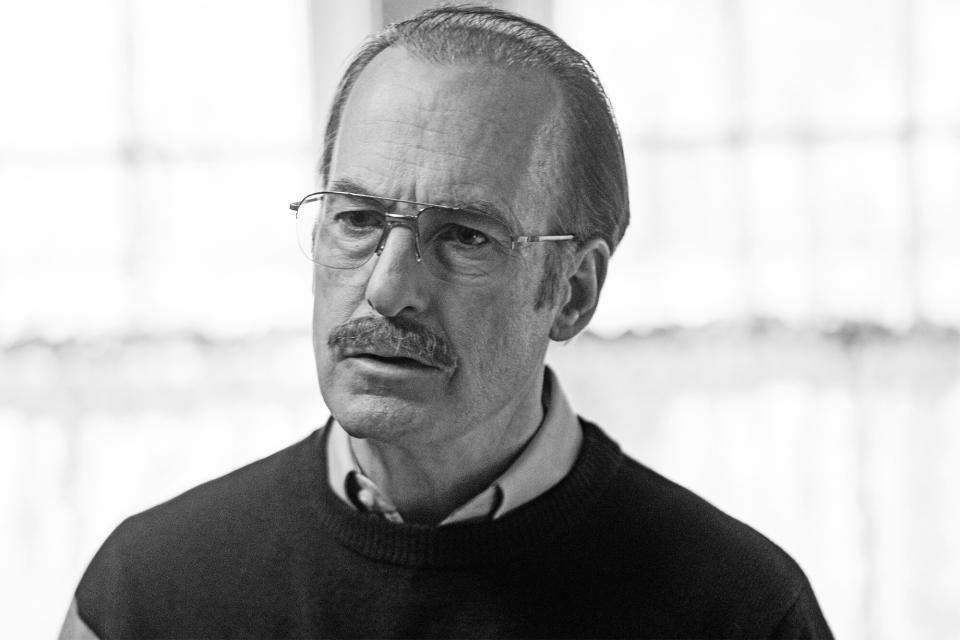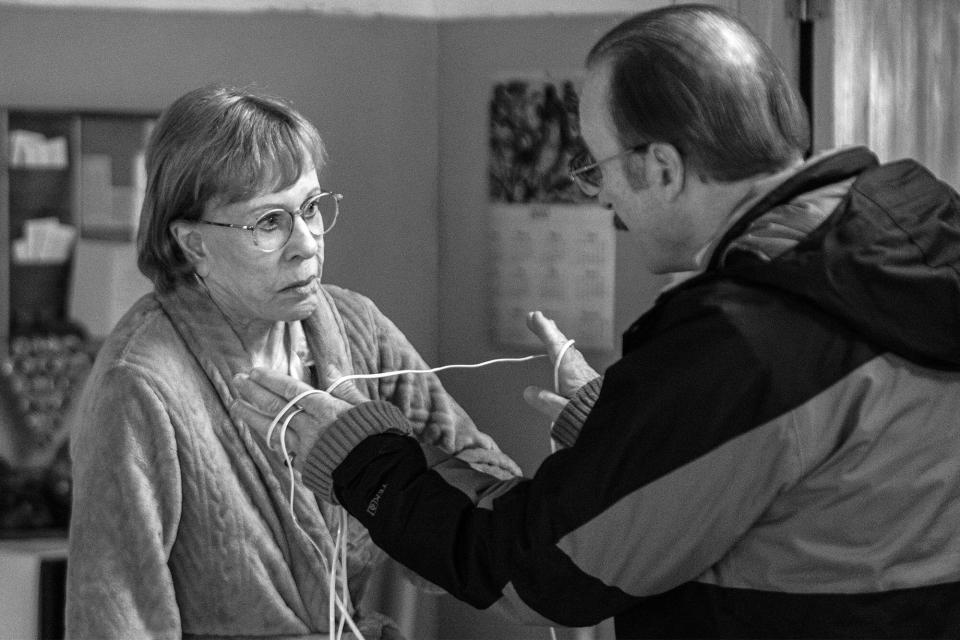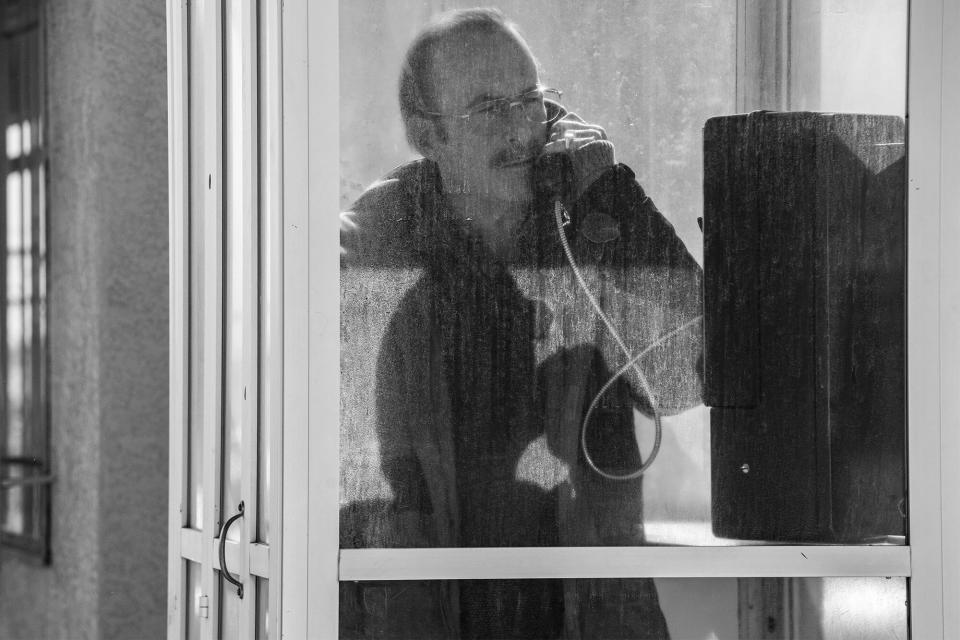Better Call Saul' s final episodes have been astonishing, whatever the finale brings
Better Call Saul returned in July at a moment of cliffhanger calamity. Howard Hamlin (Patrick Fabian) lay dead on the floor, shot by grinning Lalo Salamanca (Tony Dalton). Kim Wexler (Rhea Seehorn) and Jimmy McGill (Bob Odenkirk) looked on, horrified. The married lawyers and their renegade captor were on a collision course with Gus Fring (Giancarlo Esposito) and his trusty-crusty lieutenant Mike Ehrmantraut (Jonathan Banks). Blood, bullets, and burials ensued.
What I'm describing sounds so much like Better Call Saul that it actually sounds nothing like Better Call Saul. Across six seasons, the AMC series followed a relatively small core cast. Gus and Lalo trickled in as tormentors for poor doomed Nacho (Michael Mando), right around the same midpoint when Jimmy's brother Chuck (Michael McKean) flamed out. Saul's universe was vast, though, and some major characters never interacted. (Apparently, some of them never will.) This was a show that simmered. People could die, but the highest drama was in the paperwork, or the legal maneuvers, or in one of Jimmy's gradual con jobs. The hugest thing Gus ever did was start (then halt) construction on a hole in the ground.
This midseason premiere, "Point and Shoot," was something else entirely. Call it Mega-Saul, a high-fatality shock show where shady lawyers and devious underworlders all actually talk to each other. There was even a genuine showdown. That almost rendered the next episode, "Fun and Games," an epilogue. Gus mopped up cartel problems. Jimmy and Kim kept a poker face during Howard's funeral. But two depth charges awaited. First, Kim left everything: the law, Jimmy, New Mexico. Then came moral oblivion. A time jump reintroduced Jimmy as the once and future Saul Goodman, the crooked lawyer we met 13 years ago on Breaking Bad.

Greg Lewis/AMC/Sony Pictures Television Bob Odenkirk as Gene on final season of 'Better Call Saul'
By my count, I've just described three perfectly good TV drama endings. Gus spent his whole Saul life edging into Salamanca territory, and Lalo's death finally gave him the druggy real estate to supercharge his operation toward a cartel coup. Kim and Jimmy were the show's emotional center, so Kim's rejection of Jimmy (and her career self-destruction) would mark a clear cutoff point. And the leap forward fulfilled Saul's prequel purpose. Here was Jimmy finally putting on the Vader suit, Jimmy finally going to Mordor to meet Sauron, Jimmy finally creating the xenomorphs on the Planet of the Engineers. I'm stretching for good prequel comparisons because there are barely any good prequels, which is why Saul is the best prequel ever.
Except it isn't a prequel anymore. The three episodes after "Fun and Games" mostly move far past the Breaking Bad timeline. This future is white, black, and bleak. Co-creators Peter Gould and Vince Gilligan have demarcated the shift with extraneous clues. The "and" episode titles of season 6's first nine parts are gone. The faded-VHS title cards keep cutting to a retro blue screen, like someone's using a fuzzy old tape to record new TV. The familiar has become unfamiliar. Where did Better Call Saul go?
You could argue the show, and its title character, have assumed a new identity. In Omaha, the runaway Saul Goodman disappears behind the mustache of Gene Takavic, previously relegated to season-opening flashforwards. In a sudden-onset trilogy of episodes — "Nippy," "Breaking Bad," and "Waterworks" — Gene takes center stage, complete with a new supporting cast. There's cabbie Jeff (Pat Healy), a textbook failure-to-launcher who lives with concerned mom Marion (Carol Burnett). Jeff's pal Buddy (Max Bickelhaup) becomes the third man in Gene's criminal crew, as the gang springs from a luxury-fashion mall heist into regular defraudings of Omaha's rowdiest business bros. We've shifted from Mega-Saul to Nega-Saul, the show shorn of any obvious signifiers beyond the presence of Bob Odenkirk and Rhea Seehorn.
The episodes aren't just about Monochromatic Omaha. (MonochrOmaha?) "Breaking Bad" features long-promised cameos in Albuquerque flashbacks. "Waterworks" reveals Kim's future as a Florida phantom. But Gene gets primo real estate. Episodes start and end with him: Staring at a loud shirt-and-tie combo, bashing a window open at a mark's house. Trust the Saul writers for fearful symmetry. "Nippy" begins the Omaha trilogy when Saul meets Marion, conning her toward friendship with a sob story about a lost dog. "Waterworks" pushes those characters together for a disturbing, revelatory climax. Suspicious about her son's recent arrest, Marion Asks Jeeves about Albuquerque Con Men. Up pops Saul Goodman, clear as day. "There never was a Nippy, was there?" she asks. It's a hall of fame moment for 89-year-old Burnett, majestic and betrayed, tough but visibly heartbroken.

Greg Lewis/AMC/Sony Pictures Television Carol Burnett as Marion and Bob Odenkirk as Gene on 'Better Call Saul'
I have no idea what will happen on Monday. It's possible the finale (titled "Saul Gone") will reunite key cast members in a colorful flashback. It's equally possible that the few yet living main characters will meet again in the far future of, like, 2022. Maybe Gene assumes yet another identity. Maybe the finale is a Slippin' Jimmy feature cartoon. Maybe the four actresses who've played Kaylee Ehrmantraut will join forces to rescue the Kaylee-verse. It's certainly possible the last episode will immediately undercut literally everything I am about to say.
But I've noticed a wild array of feelings about the last few episodes. Anecdotally, I've heard love, hate, bafflement, frustration, intellectual admiration without real enjoyment, abject adoration, and everything in between. Personally, I'm in the "masterpiece" camp. This is the best and boldest run of final episodes of any TV drama I've ever seen. The biggest TV dramas tend to go volcano with their endings, ramping toward murderous climaxes or (thanks to bigger budgets and the mainstream embrace of fantasy) worlds afire. Saul did the showdown thing four episodes ago. Now we're in much freakier territory. To carry forward the Mordor analogy, we're in "Scouring of the Shire" territory now: The long sad aftermath, a feeling that what is broken will only get broker.
So I understand the clash of opinions. The Omaha shift feels singular, and willfully unconcerned about frustration. Here's a TV show with a clearly defined setting and cast — and in its final days, it's going new places with a lot of new people. Factor in Breaking Bad as part of the narrative, and you have characters like Mike and Gus with a decade-plus of screen history who have less role in the endgame than Buzz from Home Alone. The appearances by Bad's stars feel cannily low-key, avoiding any moments of canonical drama. It would've been easy to reintroduce Walter White (Bryan Cranston) in his Heisenberg shadowgod peak, giving a One Who Knocks level speech to worshipful Saul. Instead, the show opted for Walt and Jesse (Aaron Paul) at their most Laurel and Hardy. (There's even a lingering poignance to Healy's splendid and sweaty performance; because actor Don Harvey didn't return, Gene can't even hang out with the original Jeff anymore.)
The mind leaps for comparisons. In the AMC pantheon, you could note how Mad Men's final phase sent ad man Don Draper (Jon Hamm) on a cross-country quest. The ending trapped him in hippie Eden, only reachable by telephone. But Mad Men never left the rest of the cast behind — and the concluding smile retconned the whole tangent as a career-capping ad campaign. HBO's The Leftovers split everyone up on a climactic trip to Australia, but that show was always doing weird tangents.
It also lasted, like, three brisk seasons. Actually, over the course of Saul's life, the whole notion of a six-or-seven-season TV drama has faded. Hourlongs have shrunk and grown in either direction, caught between the rise of limited series and the corporate insistence on endless universes. Meanwhile, the grinding mechanics of streaming content edge Saul-adjacent material (see: Ozark) into three or four (boring, disappointing) seasons. I have patiently waited almost 1,200 words to compare Saul's last act to Twin Peaks: The Return, another franchise extension that threw audience expectations to the wind. Consider: A central famous protagonist (Kyle MacLachlan's Dale Cooper) spent most of the Showtime revival living under different identities in far-flung locations. And the mood of Twin Peaks' black-hole finale captures something of MonochrOmaha's deflation: An empty feeling that the characters have outlasted their own show, and are cut off from everyone they ever loved.
No fair, though. The Return was a single-season beneficiary of the miniseries and universe trends, picking up a legacy narrative for an 18-Hour Movie. Meanwhile, a more recent show like Atlanta (ending in season 4) can lose its whole cast for a few episodes, because savvy viewers expect anthology aspirations from any out-there sitcom. Better Call Saul has just been doing the damn thing as a single ongoing story right up to episode 63.
So the best comparison is the most obvious one. Breaking Bad revved toward its own finish line with the emotionally devastating "Ozymandias," then concluded with a redemptive bulletstorm in "Felina." In between those two hours came "Granite State," a chilly trip to New Hampshire purgatory. Fugitive Walt lives entrapped in a nowhere cabin. He pays his handler for casual conversation: Shades of Saul begging his secretary Francesca to gossip awhile, after he leaves her some money by a lonely telephone booth. The former meth-cooking dark lord quietly disintegrates, wracked by cancer, nothing to do but watch bad DVDs.
"Granite State" was written and directed by Peter Gould, who became Saul's showrunner and guiding light. No big jump to see the black-and-white Saul episodes as an expansion of that Bad episode's breakaway sensibility. Of course, Walt leaves New Hampshire with a clear mission — and as awful a human being as he had become, it was hard not to root for him against Jesse-imprisoning literal Nazis.
Amazingly, Saul's approach to its own finale has been much, much more downbeat. A phone call to Kim sends Gene down a bad choice road, hustling new cons while he drinks more and takes pointless risks. Crucial to note, I think, that the Omaha crimes are exciting. The robbery in "Nippy" gets the full Ocean's Eleven treatment, with snowbound rehearsals for a down-to-the-millisecond scheme that's nearly undone by a pratfall. Likewise, the "Waterworks" break-in is a feat of tension, with multiple moving parts (the sleeper is awaking! The cops are outside!). The new settings seem to re-inspire Saul's zest for montages, whether we're watching Gene get closer to his rubes or quickly learning about Kim's new suburban-ennui reality.

Greg Lewis/AMC/Sony Pictures Television Bob Odenkirk as Gene on 'Better Call Saul'
Is it brutal to cut the leads off from each other this late in the game? Yes, but with a purpose. I think Odenkirk and Seehorn are both delivering career-best work, partially because their character's circumstances are a silent torment. They're both living in secret; their eyes are tinted windows into tortured souls. To keep friendly Frank (Jim O'Heir) from checking the security monitors, Gene rambles a speech that becomes a confession: "I got no one. My parents are dead… my brother is dead… I got no wife. No kids. No friends. If I died tonight, no one would care." Odenkirk's giving performances within the performance: You see the excited realization that the distraction is working, and the simultaneous realization that every sad thing he's saying is true. Kim offers her own confession in "Waterworks" — and then falls to pieces in an airport bus, crying under the weight of years of guilt and disappointment. Their single phone call is actually two devastating scenes witnessed on separate occasions from both perspectives: Jimmy/Gene's destructive rage, Kim's horrified stillness.
Is Saul heading for its own "Felina," a high-octane ending with a conclusive showdown? Or will "Saul Gone" venture further into the unknown? I'm already forever haunted by the moment when Marion figures out her new friend's true identity, and Gene starts wrapping a telephone cord around his hands. "I'm still the good friend you thought I was, okay?" he promises. "Jeff understands me. Buddy understands me. And you will, too."
He sounds pitiful, and monstrous. (Freaking Buddy understands you???) Breaking Bad offered Walt one final big awesome moment, mowing down badder guys and rescuing his old partner. Will Saul be so kind? Or will this most wanted man, the former toast of the Albuquerque retirement community, exit his TV life as the guy who almost strangled 89-year-old Carol Burnett? In its final hours, the show has pushed its main characters further than most ever shows dare. Worse for them, Better for us.
Related content:

 Yahoo Movies
Yahoo Movies 